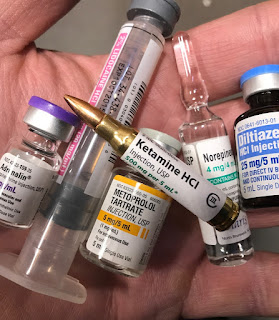Our Friends Yahbut and Iheard
I have an odd story to tell. It's truly astounding, actually. In almost thirty years of employment spanning five different career fields and ten different agencies and institutions, there have been two guys that have worked with me. Every place. As God is my witness these two dudes have been co-workers of mine for my whole life. I want to share this story because they are with me in EMS and have been especially active over the last few years - picking up tons of overtime and driving culture and paradigms. They have made and continue to make indelible markings on patient care and customer service, yet they've maintained their anonymity extremely well. They are influencers - creators of "spooky action at a distance," to borrow from Einstein.
It is time, now. Time for people to learn their names and understand the contribution they make to EMS. Please allow me to introduce them!
The first is a gentleman named "Yahbut." He's a pretty vocal guy, but he's most notable for his two skills - seeking hypothetical answers to incredibly improbable scenarios, and failing to accept straight answers from anyone. He'll stop by my office and ask a question. I'll give him an honest answer and he'll begin a cycle of "yeah, buts..." which leads invariably into a lengthy discussion about something completely moot.
"Hey, Sean." he'll say. "We don't do any training on lidocaine here for our medics."
"I know." I reply, trying to be grateful for the statement of obviousness.
"Why not?"
"Because we don't carry lidocaine anymore." I think it's polite to return the obviousness.
"Yeah, but some agencies do."
"Well, they may, but we don't." Didn't I have this conversation with my six-year old daughter yesterday?
"Yeah, but what if we someday take a transfer from a facility that is using lidocaine?" He's annoyed.
"I suppose in that case you'd reference the interfacility transfer protocols and familiarize yourself with lidocaine. There are a number of other meds in there that you may encounter as well."
"Yeah, but wouldn't it be better if we just had a training on it HERE? I mean, just in case we see it out in the field at some point."
Now it's me who's getting annoyed.
"Or you could get on the internet and review lidocaine on your own. You could even do it from your smart phone today while you're between calls." I'll try to keep the smile going.
"Yeah, but some people aren't going to do that on their own. I heard that was your job. You know, Training?" he covers the venom with a laugh.
"So you want me to mandate a training for all paramedics on a medication we no longer carry and which rarely appears in the field?"
"I don't know. It would just be nice to have some training on different things, you know?"
"On lidocaine??"
"On anything. You know CME is all the same stuff over and over again."
"We had an advanced airway lecture last month with a world-class anesthesiologist."
"Yeah, but I was working."
This is a hypothetical conversation - but it illustrates perfectly the trouble with Yahbut. He's always got a retort for anything you say. And I must admit that there are times when I just want to ask "What is it EXACTLY that you want from me right now?" It's never really clear what Yahbut really wants because his desires slowly morph as the conversation continues. It's like an ever-evolving bacteria that keeps changing every time you find an antibiotic that works.
As an EMS provider, Yahbut negatively affects the industry because, no matter what you do, he's never happy. Yahbut is, as previously mentioned, one of the more vocal people I work with so when he's not happy EVERYBODY hears about it. As is wont to occur in EMS, a cascade of "joiners" often takes up the flag for Yahbut's complaints and pretty soon everyone is miserable over something that they don't truly believe in... because it's chic now.
The message I have for Yahbut is this: I think you're a decent person and I think that you want to be involved in the process of leadership. I think you desire to be meaningful and to feel appreciated. And, believe it or not, you ARE meaningful and appreciated. However, you should find something you really believe in, do some research on it, and if it's truly going to revolutionize EMS or at least significantly improve our agency, present it to someone! In other words, be a leader that matters. Leading a mob of followers with a war cry of indiscernible griping does not make you important. It just makes you loud.
The other guy I work with is a bit more insidious in his contribution. Most of us know him as Iheard. Iheard is sometimes full of malice, but is often very well-meaning. His downfall is that he LOVES stories. He can think of nothing better than telling a story and having everyone listen intently- probably because he too wants to feel meaningful and appreciated.
Iheard didn't do well in science. He has a hard time grasping that most wonderful of common logical fallacies "post hoc ergo propter hoc." Translated it roughly means "after this, therefore because of this." This fallacy runs rampant in EMS. We do something, we see a change, and we assume that the change was due to that something we did.
Now be assured - MANY things in medicine and patient care DO occur because of the things we do. Fluid bolus' and pressors increase BP. Defibrillation stops fibrillation. These treatments are in protocol because they DO work. But it took lots of trial and error to figure out what works and what doesn't. Long before any of us were hopping up into our first shift as a brand-new EMT, these concepts were being studied and tested. They were being questioned and debated. Experiments were happening. THIS is the process we call "science." We have an idea, test that idea, test it again, and after multiple tests which yield the same result we accept the concept as fact and we insert it into protocol.
Iheard doesn't understand. He assumes that two events must be connected if one occurs after the other. He beleives that a story - an anecdote - is enough to create a paradigm shift. "I heard that you're not supposed to treat symptomatic bradycardia in STEMI patients." Says Iheard.
The next day I'm talking to Yahbut.
"Dude- this guy's rate was 30 and he had no pressure. Why didn't you treat that?"
"Yeah, but he was having a STEMI." is his reply.
"So what??"
"Well I heard..."
Sometimes Iheard gets on the internet and then, look out! Because as we know everything on the internet is true! So Iheard builds an iHerd of followers who begin to spread misinformation like a virus.
The message for Iheard is this: an anecdote does not a revolution begin. You have the potential- and the desire - to drive changes in practice. But If you really think something is clinically significant or you hear something that sounds like it might be true, don't go instigating a cascade of lies. Do some research. Ask a person who'd know. Read some studies. Do something to verify your belief. If you don't, you're setting others up for failure, and possibly endangering patients.
So if Yahbut and Iheard work with you, too, you now know what they are about. Don't hate on them- just help them to be better. Teach them- I heard education is the key to positive change. ;)


Comments
Post a Comment